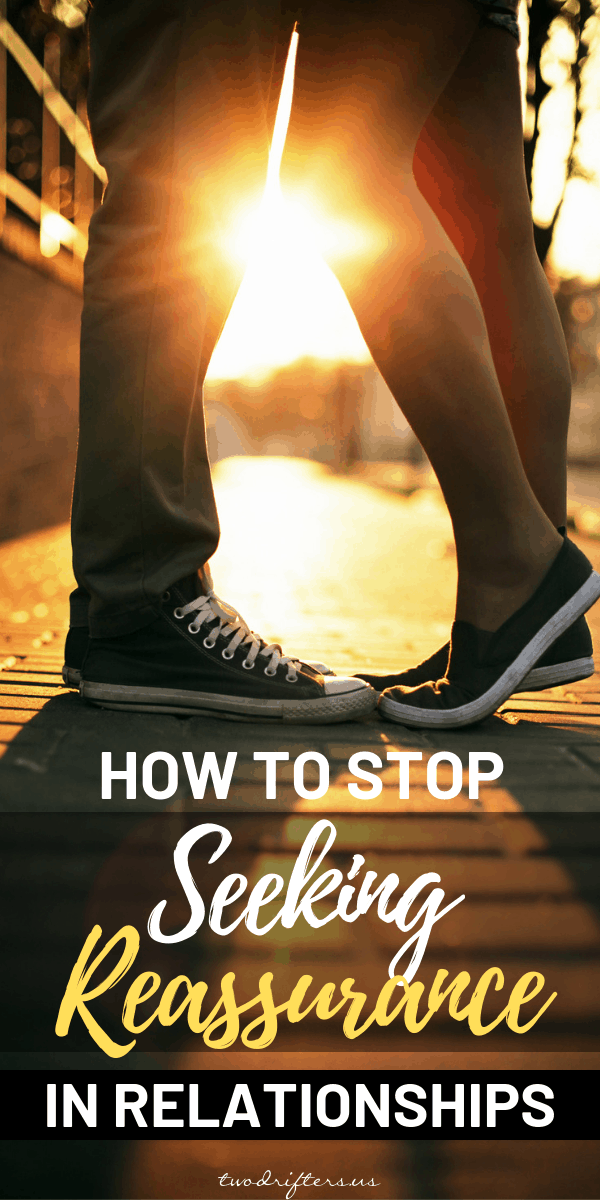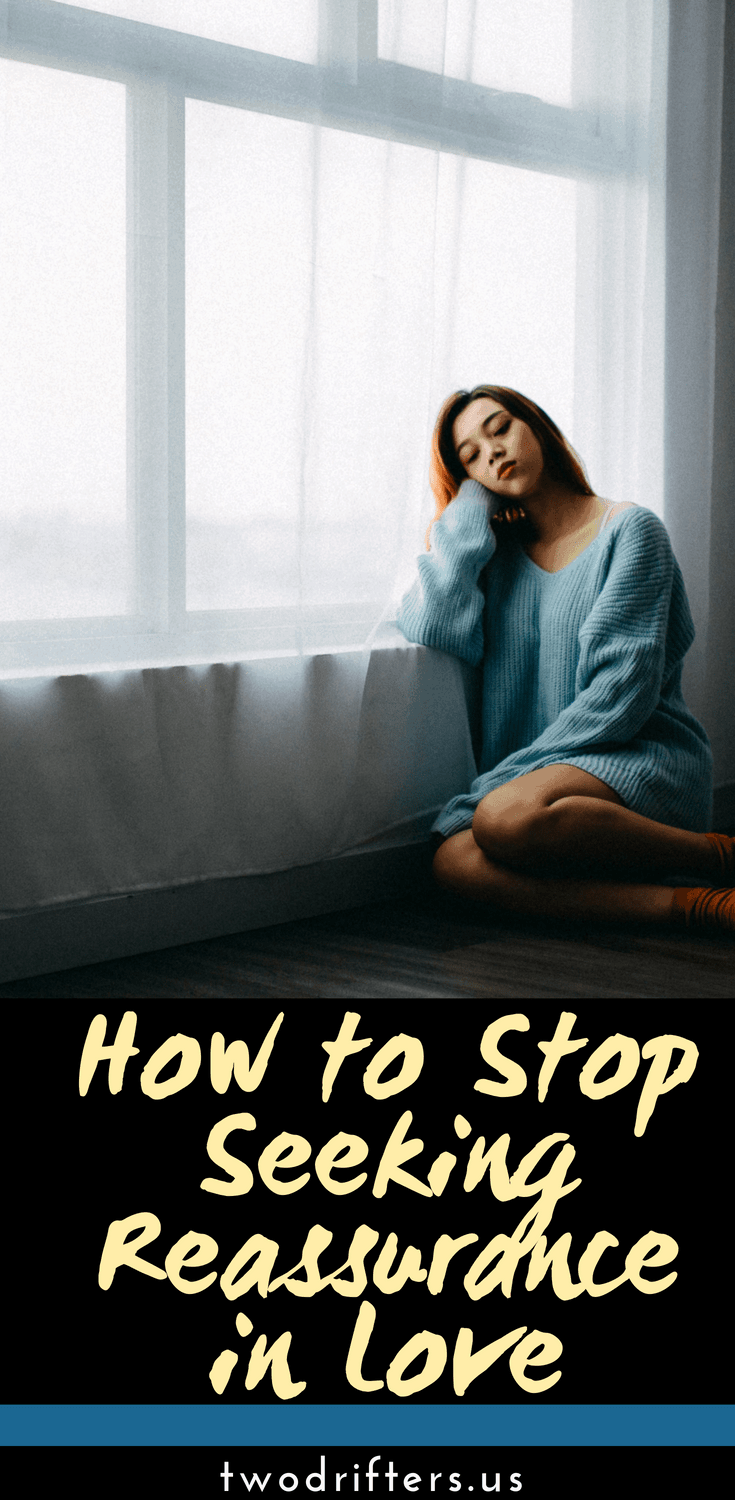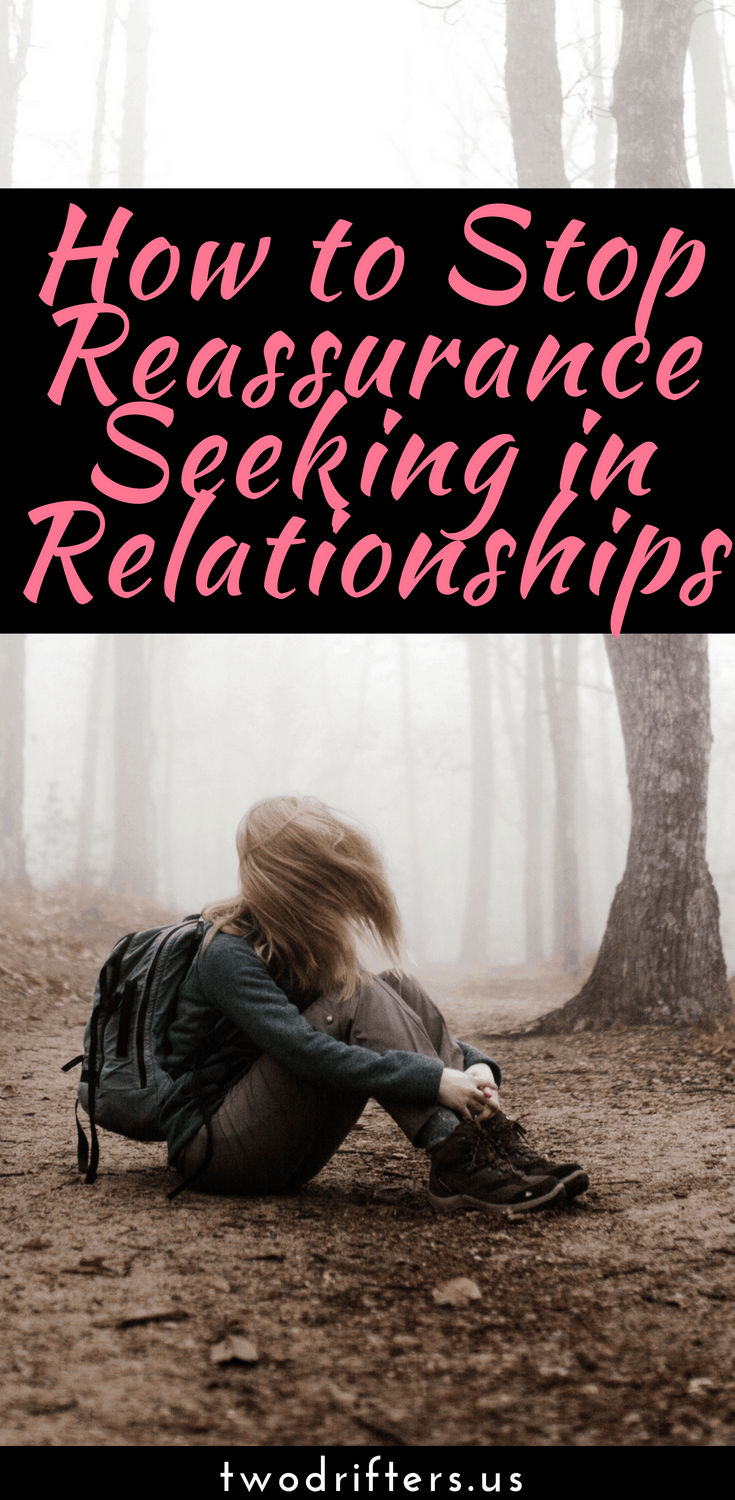This post may contain affiliate links. Read our disclosure page for full details.
Do you find that you’re constantly seeking and needing reassurance in a relationship? That was me just a few short years ago.
Do you love me? How much? More than anything? More than anyone? Will you never leave me? Promise? What if you change your mind?
These were questions I put to my husband (then-boyfriend) Nathan at 26, 27, 28, and occasionally, at 29.
Finally, I can say that, for the most part, (at 35), I no longer ask these questions. I no longer seek constant reassurance of his love for me. I no longer feel insecurity in relationships. And the story has a happy ending. I got through this issue. We got through the issue together. We’ve now been married for 5+ years and we are in a better, more loving place than ever.
That’s not to say that I’m *completely cured.* While the constant need for reassurance may have gone away, now and again anxiety rears its ugly head and I find I’m reverting to old behaviors. Yep, it still happens. (See next: Anxiety in Relationships)
That’s because I’m a work in progress. Luckily, those moments of anxiety are never as intense or debilitating as they once were. I’ve developed the tools and resources to deal with them. And it also helps to have a tremendously loving (and patient) partner who learned how to help me feel more secure.
In so many ways I am free now from needing reassurance and I am far happier and more at peace.
But why was I like this? Why did it take so long to get over? What’s the story with looking for nonstop reassurance? And for others who are wondering how to feel secure in a relationship, what can you do to heal?
In this post, I’m going to tell you my story, how I discovered how to stop needing reassurance from my boyfriend and what has helped me grow. I have practical, real-world tips on how to stop seeking reassurance in a relationship, so buckle up and let’s dive in together.
PS: You’ll want to read this post next: What is Real Love? – A Practical Guide for Humans With Hearts
Relationship Reassurance – What’s it All About
The need for reassurance is actually a universal, human one. That’s good news. It means that looking for comfort and security are completely normal things that we all do.
It’s when that all that reassurance doesn’t actually reassure us that things start to grow problematic. We then fall into a pattern of asking the same questions over and over, seeking for the magic fix, the final answer or the one thing that will finally make us feel better. The thing that will finally make us feel secure.
But we soon discover that this kind of endless searching is in vain, and the demand for a balm for our anxiety is fruitless.
Reassurance seeking is not only limited to relationships. People seek reassurance for a range of concerns and through a variety of mediums. Some people seek reassurance from friends or family about their personal concerns.
Others look for reassurance through nonstop Googling, whether it be for health worries or any other issue. We sometimes think if we just research long and hard enough, we will find our answer.
Or in my case, if I ask my partner just ONE more time if he really loves me, I will finally feel secure.
Why do I need constant reassurance in a relationship?
This is a very personal story to share on the vast, boundless Interwebs, but I think letting others hear how it was for me could help them. If you’ve ever struggled with overcoming insecurity in relationships or wondered how to stop needing constant reassurance, I hope this post can be a comfort and help to you.
Your story might be something like mine. Or it might be totally different.
I’m no psychologist, but I know I had no deficit of love growing up. My mom loved me tremendously, was very affectionate, and provided for my every need. I never felt that I wasn’t loved or cared for.
My father passed away when I was barely 3 years old. I have no real memory of him or of his death, and to be honest, I have never felt ‘actively’ sad about it. It’s like hearing about the passing of a distant relative you never met. And my mom was an amazing single parent, so I didn’t feel the lack of a second parent. But perhaps that idea of loss was integrated into my impressionable brain. Maybe it contributed to my future abandonment fears.
I was what you’d call a sensitive child. Although I was nearly always happy, it didn’t take much to upset me and I cried very easily. I had a lot of fears and anxieties growing up and I hated conflict.
Not much changed over the years. I still hate conflict and will avoid it at all costs.
Somewhere along the way, I grew to equate conflict with a lack of love. I have no idea how this originated. If anything, maybe it was just my hypersensitivity that made me very much aware of people’s feelings and aware of the “what ifs” of life. Then, at 23, I had a painful, unexpected breakup with my boyfriend of 4 years.
I had discovered that someone could hide their true feelings from me and then suddenly be completely gone from my life. It’s highly likely this is when I went down the path of feeling insecure in a relationship, and when my reassurance-seeking started.
Why do I need reassurance in my relationship if it’s such a good one?
Nathan and I started dating in 2012, and it didn’t take long for me to start freaking out.
It didn’t help that the first year and a half we were long-distance. That situation can be so tough and wreak havoc on the mind of an anxious person. And while I move fast and am prone to jumping “all in” right away, Nathan is a much slower, more thoughtful person in relationships. He moved with deliberation and care. He wasn’t “sure” as quickly as me, and to my anxious mind, that was terror!
In a lot of ways, we came to the relationship from opposite ends of the spectrum.
Our attachment styles, personalities, and each of our own separate anxieties went head to head. He’s a major introvert. I’m an extrovert.
I was pushing. He was pulling away.
He is a person who needs time to sort through his thoughts; who doesn’t say anything unless he really means it. I am someone who needs constant reassurance (or at least I used to be) and I want it right now.
So as you might imagine, this led to some painful times. And despite those, we were growing closer and more in love.
But for me, it was getting worse.
Here I was with a sweet and loving partner who was there for me, living with me, choosing to travel the world with me, and so much more, and I could not stop questioning his love for me or asking for constant reassurance of his feelings.
You might be thinking, well, maybe your partner actually didn’t love you and wasn’t showing it to you. Or perhaps he was emotionally unavailable. Nothing could be further from the truth.
Sometimes, there may be very real signs that a person does not love or respect you in the right way. If a partner is continually dishonest with you, belittles you in public or in private, acts controlling, is verbally abusive, or doesn’t respect you, such things are fairly obvious.
These are clear relationship red flags and it is no surprise that you’d be unsure of your partner’s love. (Of course, with the blinders of infatuation on, these negative things can go largely unnoticed. A good tip is sometimes to ask your friends what they think. These people have your back and they will let you know if your partner isn’t treating you the way you deserve.)
But that was not the case here.
Even when I was at my most anxious, I was logically aware that Nathan was incredibly loving, generous, patient, kind, affectionate, and respectful. He never raised his voice in anger, never belittled me, never was cruel, and he never has been. He’s a genuinely amazing person.
Oh, and it is vital that I mention that Nathan gave me TONS OF REASSURANCE. That’s the problem with the cycle of anxiety and reassurance seeking. Even when Nathan was saying the very words I wanted to hear, and demonstrating his caring to me through his actions, it still wasn’t enough.
So even as I felt the anxiety of “does my partner love me”, I always knew it had no basis in truth. The relationship was wonderful. This is how I knew I had to turn inward to fix what was breaking down.
I no longer want to be the girl who constantly needs reassurance.
So how did I stop?
How to Stop Needing Reassurance in a Relationship
It sounds cliche, but the best way to quit constantly needing reassurance is to learn to love yourself.
I know that the idea of self-love can feel frou-frou. I’m not the type to stand in front of the mirror and hug myself and tell myself I’m beautiful and worthy. But I did have to take steps to learn to love and trust myself. And pretty much everything else on the journey flows from this one single idea. Let’s keep going.
Take time for yourself
Self-care is really important, and it’s essential on the path to self-love. You have to focus on your total wellbeing. From eating better to enjoying simple pleasures like hot baths and good books, to making sure to move your body once in awhile. These are huge ways to combat anxiety. When your mind is clear, there’s less room for the scary thoughts to come swirling around.
Turn inward
You have to spend time on your own. Learn to delight in your own company. Meditation is a great tool to use as it helps you stay grounded and allows you to examine what’s going on inside. I had to learn to take time to be quiet and centered. The distractions of everyday life definitely contribute to my anxiety when it flares up.
Give journaling a try
I love writing, and journaling about my fears and feelings was super helpful. This helped me dissect them (without asking for external reassurance) and allowed me to see the reality when I was stuck in my worries. It clearly demonstrated the facts and helped me see that I was feeling insecure in a relationship for no reason.
Learn Inner Bonding
Finding tools to help you is vital. Part of my journaling was a life-changing practice called Inner Bonding. Be sure to check it out as it can really make a difference.
For me, this entailed identifying and connecting with a few different “parts” of myself, including my Inner Child, my Wounded Self, and my Loving Adult. My Loving Adult helped me navigate my fears and insecurities and silence my fear-based Wounded Self.
Essentially, this was a way for me to become my own comforter, reassurance-giver, and wise spirit. Interestingly, the Loving Adult was there within me all the time, but only with contemplative practice did she discover how to come out and let me trust her. This step was probably the single most important thing I did to heal from my reassurance seeking.
Learn to trust again
Ultimately, while this was about me and my own issues, I had to take a look at the way I approached my relationship. I did this through journaling, self-reflection, and therapy.
I realized that I was so afraid of “what if’s” that I was failing to trust Nathan fully. And it didn’t matter that Nathan is the most trustworthy person I ever met. I had no cause to think he was planning to leave me or hurt me.
Love is scary and it is always a risk, but you have to be all in. You have to allow yourself to be vulnerable. Eventually, my brain caught up with my heart and I started to just put my trust in him more and more.
Figure out how to deal with uncertainty
Uncertainty is one of those things your anxiety latches onto so easily. It’s not uncommon to have those “what if’s” leaving you with feelings of insecurity in a relationship.
What if you or your partner dies? What if one of you cheats? What if you want a divorce? The simple truth is you cannot live your life wondering about what may or may not happen. All you can do is your very best with the information you have at any given moment.
And if your partner has shown himself to be a reliable, trustworthy, and loving person in the past, then by all probability, that behavior will only continue!
Despite the inherent uncertainty of relationships, when you decide to commit to someone, you just have to commit to working hard, loving through action, and sticking with your relationship through all its trials and tribulations. We wouldn’t need to take vows if we knew everything was going to be smooth sailing, would we?
Insecurity and anxiety go hand in hand, but you sometimes have to just take the leap. (Check out this excellent book Feel the Fear and Do it Anyway).
Develop skills for handling conflict
I found that one big contributor to my need for seeking reassurance was my fear of conflict. Ugh. My issue was that I viewed even minor tiffs as “conflict.” For some reason, I equated the idea that if Nathan got annoyed with me, he would leave me. It was totally illogical.
He was really instrumental in helping me with this, through his patience and his helpful way of reminding me even during arguments that his feelings hadn’t changed he still loved me. And I’ve since grown much more comfortable navigating any tense moments that arise. (Because they do. We’re human).
I can’t stress how important it is to learn to accept conflict as a natural part of a relationship. It’s not a “death knell.” It’s not a sign of something deeper. Normal, regular conflict is expected and healthy. When you start seeing it in this way, it becomes much less scary and far easier to actually deal with.
If you do find handling conflict to be a challenging process, don’t be afraid to get outside help. Resources online can help, like this one.
Discover what healthy reassurance means
Getting to a healthy relationship with the idea of reassurance is important. Just because you’re working to no longer need constant reassurance does not mean that you don’t need it at all! On the contrary, it’s smart to figure out what healthy relationship reassurance would look like for you.
Discuss the following with your partner:
What does reassurance mean in a relationship? In our relationship, specifically?
What are some examples of reassurance in a relationship that would be helpful to you?
What makes you feel loved? What makes you feel secure?
Find out your “love languages”
Building on the previous tip, figuring out you and your partner’s love language can be a huge help towards ensuring you feel secure and reassured.
Not knowing your love languages can actually contribute to the problem, because it can reveal unmet and unknown expectations.
I learned that I contributed to my own anxiety through my expectations. I am an extremely verbal person. I love being told sweet things, I adore written cards and letters, and a well-placed compliment never goes unappreciated! Surprise, my love language is “Words of Affirmation.”
But while my love language is words, that isn’t Nathan’s. And here I was waiting for him to pour out his adoration almost nonstop (very unrealistic). No wonder I was second-guessing his affections and freaking myself out. He thought he was showing his love in other ways, but I just wasn’t “hearing” it.
Together, we’ve worked to discover one another’s and to learn how to give love in the way the other person most needs and desires it.
By the same token, I’ve learned how to see love in the other languages, to notice that it’s always all around me, even when not spoken (although Nathan tells me he loves me many times every day).
The The 5 Love Languages is a great book and can be quite beneficial to any couple. Once we understood one another better, it was easier to give and receive love in many different ways.
Get My Book!
Did this article resonate with you? Want to go more in-depth with all this stuff? I’ve written an ebook just for fellow reassurance-seekers like myself. I’d love for you to check out my book Do You Love Me? How to Stop Seeking Reassurance in Relationships. It’s a quick read, but it’s packed with useful info, encouragement, and even excerpts straight from my own journal. You’re not alone, and you can totally get through this!
If you are finding yourself held back by a need for constant reassurance in relationships, I hope this post can show you that you are far from alone. This is a common issue among both men and women, but with patience, inner love, and self-discovery, it’s possible to heal from this anxiety and move forward. Perhaps it’s time you finally accept the beautiful love right in front of you.
You might also like these posts:
- Relationship Advice for Couples: 12 Principles for Lasting Relationships
- Relationship Rituals That Will Help Your Love Last
- We are Not Each Other’s Soulmates, But That’s Okay
- 15 of the Best Marriage & Relationship Books for Couples
- 7 Important Tips for Dating an Introvert
- 10 Most Common Relationship Problems (and how to fix them!)
- How to Build Trust in a Relationship (Even if it’s Broken)

Amy Hartle is the author of Do You Love Me? How To Stop Seeking Reassurance in Relationships, a book on reassurance seeking and relationship anxiety. Both her book and this blog are born of personal experience; Amy shares expert relationship advice from the lessons learned during her own 10+ years with her husband, as well as couples travel tips and romantic getaway recommendations, all gleaned while traveling the world together.







